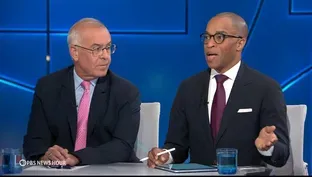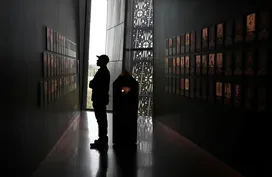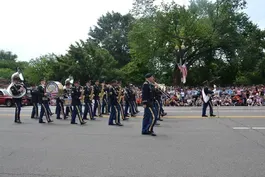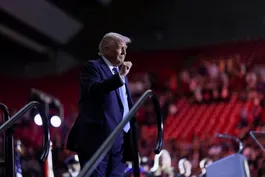
Yemeni diplomat asks U.S. for more support fighting Houthis
Clip: 5/2/2025 | 9m 33sVideo has Closed Captions
Top Yemeni official visits Washington seeking more U.S. support in fighting Houthis
The Houthis are an Iranian-backed rebel group that controls parts of western Yemen. Most of the rest of the country is controlled by the internationally recognized government, which has fought the Houthis with support from a Saudi-led coalition. In March, the U.S. started a campaign targeting Houthi leadership. Nick Schifrin discussed the latest with Yemeni Vice Foreign Minister Mustapha Noman.
Problems with Closed Captions? Closed Captioning Feedback
Problems with Closed Captions? Closed Captioning Feedback
Major corporate funding for the PBS News Hour is provided by BDO, BNSF, Consumer Cellular, American Cruise Lines, and Raymond James. Funding for the PBS NewsHour Weekend is provided by...

Yemeni diplomat asks U.S. for more support fighting Houthis
Clip: 5/2/2025 | 9m 33sVideo has Closed Captions
The Houthis are an Iranian-backed rebel group that controls parts of western Yemen. Most of the rest of the country is controlled by the internationally recognized government, which has fought the Houthis with support from a Saudi-led coalition. In March, the U.S. started a campaign targeting Houthi leadership. Nick Schifrin discussed the latest with Yemeni Vice Foreign Minister Mustapha Noman.
Problems with Closed Captions? Closed Captioning Feedback
How to Watch PBS News Hour
PBS News Hour is available to stream on pbs.org and the free PBS App, available on iPhone, Apple TV, Android TV, Android smartphones, Amazon Fire TV, Amazon Fire Tablet, Roku, Samsung Smart TV, and Vizio.
Providing Support for PBS.org
Learn Moreabout PBS online sponsorshipAMNA NAWAZ: Today, the Defense Department ordered an aircraft carrier to remain in the Middle East.
That means the U.S. will maintain two carriers in the region, in part because of the ongoing war against the Houthis in Yemen.
For seven weeks, the U.S. has been bombing the group that it labels as terrorist in response to its attacks on commercial and U.S. ships.
Nick Schifrin speaks to a senior member of Yemen's internationally recognized government.
NICK SCHIFRIN: The Houthis are an Iranian-backed rebel group that in 2014 seized the capital, Sanaa, and much of the country's northern highlands and coast along the Red Sea.
Most of the rest of Yemen is controlled by the internationally recognized government, which has fought the Houthis with the support of a Saudi-led coalition that failed to defeat the Houthis with seven years of U.S.-backed airstrikes.
Beginning in November 2023, Houthi rebels launched more than 100 attacks on commercial vessels and U.S. Navy ships.
The Houthis claimed to attack ships linked to Israel in solidarity with the war in Gaza, but their targets were much wider.
Earlier this year, during a Gaza cease-fire, the Houthis paused their attacks.
But when Israel blocked humanitarian aid to Gaza and restarted the war, the Houthis started targeting Israel again and vowed to target ships.
In mid-March, the U.S. started a new bombing campaign that for the first time targeted Houthi leadership, vowing to continue it until the Houthis stopped their attacks in the Red Sea, a vital trade corridor.
To discuss this, I am joined by Mustapha Noman, the vice foreign minister of the internationally recognized Yemeni government.
Mustapha Noman, thank you very much.
Welcome.
MUSTAPHA NOMAN, Yemeni Vice Minister Foreign Affairs: It's an honor to be with you.
NICK SCHIFRIN: Do you believe the U.S. bombing campaign so far has been effective?
And can it achieve what the U.S. says is the goal, to stop these Houthi attacks on ships?
MUSTAPHA NOMAN: Nobody has an assessment or a conclusive figure of what's happening, what are the losses, how much are the Houthis weakened?
And if you don't have all these parameters, you will not be able to decide if the campaign has achieved its goals, which the Yemeni government does not have an idea what they are.
We have seen so many statements, official statements, either by the president or vice president, the secretary, and they are talking about the security in the Red Sea.
And my question is, what if the Houthis decide now that they are -- they will not attack anymore vessels, no commercial vessels or no military vessels?
What would be the response of the administration?
This is what my government is seeking to understand.
NICK SCHIFRIN: And, to this moment, you're here in Washington.
You still do not understand it?
MUSTAPHA NOMAN: I came here with many questions and I will be leaving with more of them.
NICK SCHIFRIN: Let me play one version of what the U.S. goal is, stated by Vice President Vance last night on FOX News, making it clear the mission was restricted and making it clear he was OK with the Houthis so long as they weren't attacking ships.
J.D.
VANCE, Vice President of the United States: I actually think we're at a good place for the Houthis to stop attacking civilian vessels, to go back to doing whatever it is they were doing before they were attacking civilian vessels.
And I think that, if that were happening, then this bombing campaign would be over the next day.
NICK SCHIFRIN: Do you support the U.S. having that kind of restricted mission?
MUSTAPHA NOMAN: Whether I approve it or not would make any difference.
But if the Houthis said we're done, for me, as the Yemeni government, that would not solve the problem in Yemen.
That would create more problems.
That would create a vacuum that nobody can fill.
The only guys who can fill this vacuum are the al-Qaida or ISIS.
If the Houthis are weakened to the point that they relinquish the territories they are now controlling, now you will need the government to come and fill in this vacuum.
But the government at this moment is seeking the assistance of the United States, either by arms or by the logistical assistance or by funding the army to go into this war, which is not happening until this moment.
NICK SCHIFRIN: OK, so let's zoom in on that.
What you're saying is, the U.S. cannot achieve its goals without some kind of ground operation.
Is that right?
MUSTAPHA NOMAN: Absolutely.
Absolutely.
I mean, the air campaign has never succeeded anywhere.
You have to have a ground offensive.
You have to have an organized, disciplined army on the other side or armed forces on the other side that can help you in achieving, so you can bomb an area, and you let your partner on the other side to come and fill it.
Until this moment, it's not happening.
We are just seeing an air campaign that is definitely weakening the Houthis.
But the question would be, is it weakening them to the point that will allow the government forces to come in and help?
And if that is the case, is the national army well-equipped to do that?
And the other question is, is the United States willing to arm the national army to go into this war?
NICK SCHIFRIN: And do you know the answer of whether the United States is willing to?
MUSTAPHA NOMAN: No one has a conclusive answer.
What my fear is, what if the administration gets impatient?
Because we know that there are increasing expenses on this -- for this campaign.
So what if the administration says, well, we have done enough, we have weakened the Houthis enough, so it's now for the Yemenis to decide what they want to do next?
The administration has been very clear.
The goal of this campaign is not regime change.
It's not to solve the Yemenis' problem.
It's just to secure the safety and security in the Red Sea.
For me as a Yemeni, I care about Yemen, the land, the territory, the borders, more than I care about what's happening in the Red Sea.
NICK SCHIFRIN: So answer your own question.
What happens if the U.S. keeps this mission restricted, does not support ground troops, and therefore at one point does say, OK, the Houthis stopped, so we're going to stop?
MUSTAPHA NOMAN: The Houthis will be -- will not disappear.
And then we can start this whole cycle again over and over and over.
NICK SCHIFRIN: Regardless of what the U.S. decides, are you today capable of mobilizing anti-Houthi forces?
MUSTAPHA NOMAN: The government has not enough arms.
Like, the government doesn't have an air force.
It doesn't have helicopters, no air fighters, no cannons, no tanks.
So with all this deficiency within the government power, it's very hard to see how we can help.
NICK SCHIFRIN: But, as we say, there's a bit of a chicken-and-egg question here.
Regardless of whether the U.S. is ready... are you ready if the U.S. and coalition allies were to make this decision to help you?
MUSTAPHA NOMAN: Yes, we are emotionally ready... but not equipped enough to do that.
Don't forget that the Houthis have enough weapons to go after all the infrastructure... NICK SCHIFRIN: Iranian-backed?
MUSTAPHA NOMAN: Yes, of course.
And they have enough arms, missiles, drones.
They can go after all the infrastructure under the government - - in the government territories.
NICK SCHIFRIN: There's another narrative that skeptics of any kind of plan of doing any kind of ground operation in Yemen have right now, which is that these anti-Houthi forces are fragmented, that they fight each other, and then they're not capable of coordinating in efforts.
Is that true?
MUSTAPHA NOMAN: It's not yet, until this moment, unified.
What the government is trying to do is to have an operations room for all these forces to start to coordinate between them.
And if that happens and if it's established on the ground, then they can go after the Houthis.
NICK SCHIFRIN: Let me switch to the humanitarian situation.
An estimated 19.5 million people, over half the population, is dependent on aid, nearly five million displaced.
And over the last five years, the U.S. has been consistently Yemen's largest donor.
But our sources tell us many humanitarian projects in Southern Yemen have been forced to shut down due to recent USAID funding cuts.
What's the impact on civilians of those cuts?
And are you in negotiations with the Trump administration to try and get some of those humanitarian funds back?
MUSTAPHA NOMAN: I will give you an example.
The World Food Program, the WFP, has announced that they were feeding 9.5 million Yemenis.
With the funding reduced now, they are capable of just feeding 2.2 million.
And by the end of this year, it will be zero.
The population is not going to go into hunger.
It's going to go into famine because of this cut of the USAID.
And even at that time, if the United States decided to resume, I'm sure they are not going to do what they used to do, not the full budget, not the full volume of the money that they use in Yemen.
And... NICK SCHIFRIN: And so people will die?
MUSTAPHA NOMAN: Absolutely.
And if that happens, the air campaign will never achieve its goals.
You -- we have to combine them both.
If you want to win this war in the Houthi areas, you have to make the other side, the other -- the population that's living out of the Houthi areas, to feel that they are fed, that somebody cares about, and that they are -- the United States, as the major donor to all the humanitarian assistance in Yemen, will resume its activities.
NICK SCHIFRIN: Mustapha Noman, the vice foreign minister of the internationally recognized government, thank you very much.
MUSTAPHA NOMAN: Thank you very much.
Brooks and Capehart on reaction to Trump's first 100 days
Video has Closed Captions
Clip: 5/2/2025 | 10m 46s | Brooks and Capehart on what voters think about Trump's first 100 days (10m 46s)
Conservative perspective on Trump's authority over history
Video has Closed Captions
Clip: 5/2/2025 | 6m 26s | Conservative offers perspective on Trump's effort to exert authority over history and art (6m 26s)
Jobs market defies expectations amid tariff fears
Video has Closed Captions
Clip: 5/2/2025 | 4m 51s | Jobs market defies expectations amid fears tariffs could soon spur economic downturn (4m 51s)
A look at Trump's order targeting public media funding
Video has Closed Captions
Clip: 5/2/2025 | 5m 56s | A look at Trump's executive order targeting public media funding (5m 56s)
News Wrap: Army plans anniversary parade on Trump's birthday
Video has Closed Captions
Clip: 5/2/2025 | 6m 53s | News Wrap: Army plans 250th anniversary parade on Trump's birthday (6m 53s)
Unpacking Trump's budget proposal and what he wants to cut
Video has Closed Captions
Clip: 5/2/2025 | 6m 55s | Unpacking Trump's budget proposal and where he wants to cut billions in spending (6m 55s)
Providing Support for PBS.org
Learn Moreabout PBS online sponsorshipSupport for PBS provided by:
Major corporate funding for the PBS News Hour is provided by BDO, BNSF, Consumer Cellular, American Cruise Lines, and Raymond James. Funding for the PBS NewsHour Weekend is provided by...

















